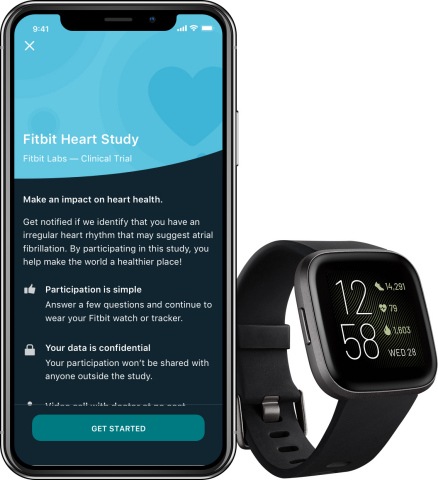 Fitbit has today launched the Fitbit Heart Study, its first large-scale, virtual study to validate the use of its wearable technology to identify episodes of irregular heart rhythm suggestive of atrial fibrillation (AF). This study is part of the company’s broader strategy to make easy-to-use tools that accelerate detection of a range of conditions more accessible. The Fitbit Heart Study aims to enrol hundreds of thousands of people, and its results will support the company’s regulatory submissions globally, it said in a press release.
Fitbit has today launched the Fitbit Heart Study, its first large-scale, virtual study to validate the use of its wearable technology to identify episodes of irregular heart rhythm suggestive of atrial fibrillation (AF). This study is part of the company’s broader strategy to make easy-to-use tools that accelerate detection of a range of conditions more accessible. The Fitbit Heart Study aims to enrol hundreds of thousands of people, and its results will support the company’s regulatory submissions globally, it said in a press release.
“Until recently, tools for detecting AF had a number of limitations and were only accessible if you visited a doctor,” said Steven Lubitz, principal investigator of the Fitbit Heart Study, cardiologist at Massachusetts General Hospital and Associate Professor of Medicine at Harvard Medical School (Boston, USA). “My hope is that advancing research on innovative and accessible technology, like Fitbit devices, will lead to more tools that help improve health outcomes and reduce the impact of AF on a large scale.”
Fitbit wearables have the potential to accelerate AF detection as their 24/7 heart rate tracking is powered by long battery life, which allows users to wear their device for multiple days at a time, the company’s press release adds. This enables long-term heart rhythm assessment, including when users are asleep. The optimal way to identify irregular rhythm through heart rate tracking technology is to screen when the body is at rest, making assessment overnight, while people sleep, ideal for detection.
“Since we first brought heart rate tracking to the wrist in 2015, we have continued to innovate and provide users with a deeper understanding of their heart health through features like Sleep Stages, Cardio Fitness Level and now Active Zone Minutes,” said Eric Friedman, Fitbit co-founder and CTO. “The Fitbit Heart Study advances our heart health efforts. Long-term passive heart rhythm assessment with our wide range of affordable devices powered by 24/7 heart rate tracking technology has the potential to improve earlier identification of AF, which is a key to reducing the risk of a life-threatening event like stroke. By doing this important research we have the opportunity to develop and provide access to technology that may be able to improve public health and save lives.”
To track heart rate, Fitbit’s devices use photoplethysmography (PPG) technology to measure the rate of blood flow directly from a user’s wrist. Theoretically, these measurements can be used to determine a user’s heart rhythm, which Fitbit’s algorithm will analyse for irregularities in the study. Study participants who receive a notification about an irregular heart rhythm will be connected with a doctor for a virtual appointment at no cost to get more information and may receive an electrocardiogram (ECG) patch in the mail at no cost to confirm the notification.







